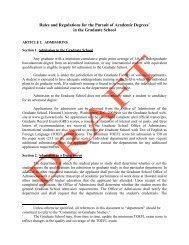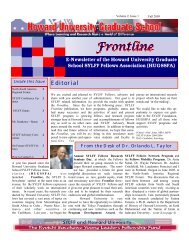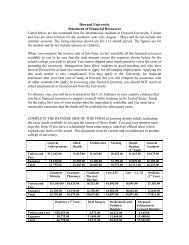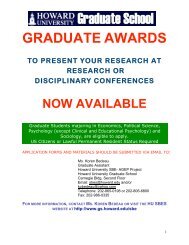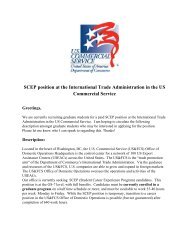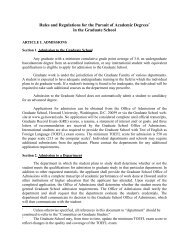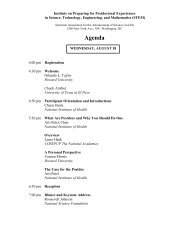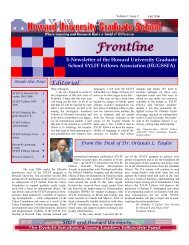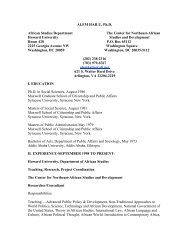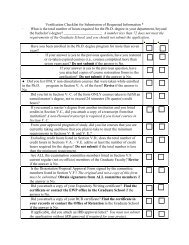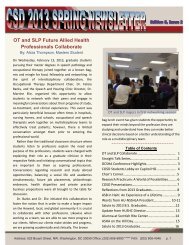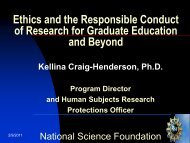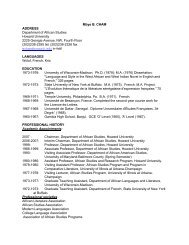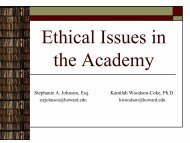Self-Study Design - Howard University, Graduate School
Self-Study Design - Howard University, Graduate School
Self-Study Design - Howard University, Graduate School
Create successful ePaper yourself
Turn your PDF publications into a flip-book with our unique Google optimized e-Paper software.
provide a thorough response to the question of whether or not it is providing to all<br />
undergraduates a highly competitive, relevant, first-rate educational experience reflective of the<br />
<strong>University</strong>’s missions and goals.<br />
Research Questions.<br />
1. What is the value of a liberal arts education and core curriculum at peer institutions?<br />
2. What are the core courses required of students in each school at <strong>Howard</strong> <strong>University</strong>?<br />
3. Are objectives clearly stated for the general education requirements in each school?<br />
4. How effectively are general education requirements and major academic program<br />
requirements linked and interrelated?<br />
5. Are core courses in each school integrated into <strong>Howard</strong> <strong>University</strong> “universal”<br />
experiences? In other words, do these courses reflect the presence of a common set of<br />
themes and competencies?<br />
6. Are there first-year core requirements in each school?<br />
7. Do first-year programs share a common core of information students must know about<br />
<strong>Howard</strong> <strong>University</strong>?<br />
8. Are some schools using alternative core experiences in lieu of courses?<br />
9. Are there assessment components in place for general education programs in each<br />
school? In other words, what evidence exists that graduates meet expected, acceptable<br />
levels of competency in oral and written communication, scientific and quantitative<br />
reasoning, technological capability, information literacy, and critical analysis and<br />
reasoning? Are these levels appropriate given the institutional mission and the needs and<br />
aspirations of students?<br />
Standard 13: Related Educational Activities<br />
• Chair: Professor, Teresa Redd, Center for Excellence in Teaching, Learning, and<br />
Assessment<br />
Scope of Work and Objectives.<br />
This scope of work investigates whether the <strong>University</strong>’s related educational activities meet the<br />
Middle States Commission’s accreditation standard. According to Middle States, “related<br />
educational activities” include “programs or activities that are characterized by particular<br />
content, focus, location, mode of delivery, or sponsorship.” Specifically, these activities include<br />
basic skills courses, certificate programs, experiential learning opportunities, non-credit<br />
offerings, branch campuses, distance-learning activities, and contractual relationships.<br />
Research Questions.<br />
1. How well does the <strong>University</strong> identify and place students who lack college-level math,<br />
English, and study skills?<br />
2. How consistently is the <strong>University</strong> bringing these under prepared students up to the<br />
college level?<br />
3. Should <strong>Howard</strong> re-examine its commitment to teaching basic skills to students with high<br />
academic potential?<br />
4. Do <strong>Howard</strong>’s distance-learning courses help the <strong>University</strong> fulfill its mission? For<br />
example, do these courses enhance quality or increase accessibility? If not, what is<br />
<strong>Howard</strong>’s rationale for offering these courses?<br />
25



